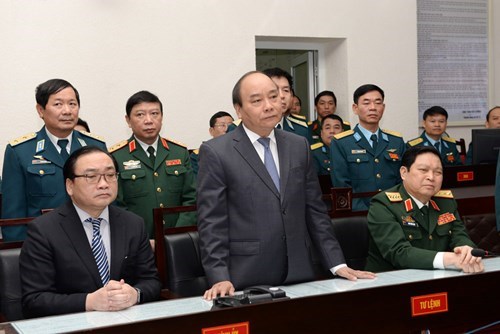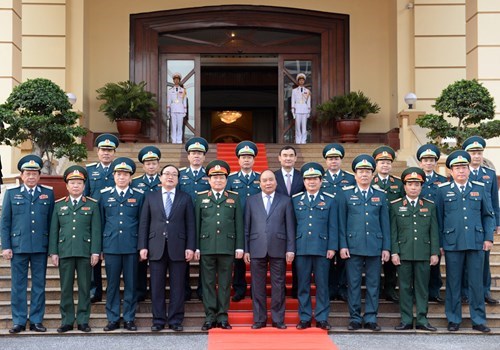He was accompanied by Politburo Member, Deputy-Secretary of the Central Military Commission and Defense Minister General Ngo Xuan Lich; Politburo Member and Secretary of the Hanoi Municipal Party Committee Hoang Trung Hai; and Deputy-Director of the General Department of Politics of the Vietnam People’s Army Lieutenant General Le Hien Van.
    |
 |
| Prime Minister Nguyen Xuan Phuc (C) talking to air defense and air force troops via a teleconference. |
All top leaders of the Air Defense-Air Force Service welcomed the Prime Minister and other delegates.
Continuously improving the quality of training and combat readiness
At the Headquarters of the Air Defense-Air Force, Chief of the service, Lieutenant General Le Huy Vinh briefed Prime Minister Nguyen Xuan Phuc on the force’s task performance in the past time focusing the results of its airspace management and quality of its combat readiness.
Via a teleconference, the Prime Minister later talked to air defense and air force troops who are fulfilling their duties on some islands of the Truong Sa (Spratly) Archipelago, troops of Air Defense Division 361 and Air Force Division 370. He listened to their reports as well as their opinions, suggestions and aspirations.
All officers and soldiers participating in the conversations felt happy and proud as they could talk to the Prime Minister and defense leaders. According to them, the Party, State and Army have taken good care of them and equipped them with modern weapons and equipment so that they could have good lives and improve the quality of training and combat readiness. In the coming time, the troops promised to restlessly promote a sense of responsibility in fulfilling their assigned tasks and deny any unexpected eventualities to happen in the national airspaces.
On behalf of the Party and State, Prime Minister Nguyen Xuan Phuc delivered encouragement to all participating troops. He recognized and praised the troops’ efforts and achievements in the past time, and asked them to continuously promote the traditions of the Army and their units, overcome any difficulties, conduct well all training and drills, and excellently accomplish their duties and assignments, deserving the trust of the Party, State and people and the title “Uncle Ho’s Soldier.”
The Prime Minister also took the chance to congratulate all troops of the Air Defense-Air Force on the 73rd founding anniversary of the Vietnam People’s Army (December 22, 1944), 28th National Defense Festival (December 22, 1989), and 45th anniversary of the “Hanoi-Dien Bien Phu in the Air” Victory (December 18-29, 1972).
“Hanoi-Dien Bien Phu in the Air” Victory – a resplendent mark in national history
After a tour around the Headquarters of the Air Defense-Air Force and talks with troops on guard in remote places and islands, Prime Minister Nguyen Xuan Phuc; Defense Minister Ngo Xuan Lich; Party Secretary of Hanoi; leaders of the Defense Ministry, Central agencies and Hanoi; leaders, former leaders and veterans of the Air Defense-Air Force attended a grand ceremony to observe the 45th anniversary of the “Hanoi-Dien Bien Phu” Victory.
Lieutenant General Le Huy Vinh delivered the opening speech at the meeting, clarifying the plot of the US Army when they launched Linebacker II with the use of B52s to bomb Hanoi and Hai Phong during the 12 days (December 18-29, 1972). He also pointed out the Party’s and Uncle Ho’s brilliant mindset and excellent abilities to predict and appraise the situation in the late 1960s, and direct the whole people and army with the Air Defense-Air Force as the core force to prepare forces, weapons and combat plans to resolutely defeat possible US B52-based air-strikes on the North. As a result, the Air Defense-Air Force shot down US aircraft, including B52s, in the first battle on the night of December 18, 1972, opening a course of feats of arms of the people and military in the North.
Over the 12 days of fighting the enemy in an undaunted, brave, resourceful and creative manner, the people and army in the North defeated the US Army’s largest-ever air-strike operation, creating the historic “Hanoi-Dien Bien Phu in the Air” Victory. During the campaign, the Northern people and military shot down 81 US aircraft, including 34 B52s. Suffering the heavy losses, the US Administration had to declare a stop to the bombing operations from the 20th Parallel North, and accepted to return to negotiations with representatives of the Vietnamese Government and Temporary Revolutionary Government of South Vietnam in Paris. This victory also led to the Agreement on Ending War and Restoring Peace in Vietnam signed on January 27, 1973, in Paris between the Vietnamese Government and Temporary Revolutionary Government of South Vietnam as one side, and the US and its Saigon puppet government as the other side, forcing the US Army to withdraw its forces from South Vietnam.
Speaking at the meeting, Prime Minister (PM) Nguyen Xuan Phuc underscored the great significance and position of the “Hanoi-Dien Bien Phu in the Air” victory for the whole national liberation and unification cause. He said that the victory contributed to creating a new posture and power for the nation, reinvigorating the Southern people and army in the fight against US invaders and their followers to protect the Fatherland, and encouraging the oppressed peoples around the world in their movements and struggles against neo-colonialism and imperialism. PM Phuc considered that the “Hanoi-Dien Bien Phu in the Air” victory, together with the Chi Lang, Bach Dang, Van Kiep and Dong Da victories, is a forever resplendent mark in the national anti-foreign invasion history.
While praising the heroism of the Air Defense-Air Force over the 12 days of December 1972, PM Phuc also underscored the sound leadership of the Party and Uncle Ho, Vietnam’s whole people warfare, and great supports and assistance from international friends and progressive people around the world.
Ready to win the first battle, and win all following battles in modern warfare
At the meeting, PM Phuc also asked the Air Defense-Air Force to fulfill 5 major directions in implementing the service’s assigned missions in the coming time.
    |
 |
| Delegates in a joint photo with the service's commanders |
First, he asked the service to enhance force-building with a focus on improving the qualities and abilities of officers and soldiers via education and training and strict observance of military discipline. According to the PM, the Air Defense-Air Force has been prioritized by the Party, State and Army to modernize its forces. Although modern weapons and equipment are very important, man is the decisive factor for every victory in modern warfare. He stressed that the service’s officers and soldiers should restlessly study and train to improve their political awareness, military abilities and skills so as to meet the task requirements in the current context. The service must assure that its officers and soldiers will have good scientific and technological knowledge and military abilities to fight in modern warfare, overcome all difficulties and hardships to completely fulfill their assigned tasks, and be ready to win the first battle and all battles if a modern war were ever to break out.
Second, the service should continuously improve and complete the air defense posture in line with the overall defensive posture in every zone while following and grasping the situation, subverting all adversaries’ attempts and artifices so as to craft timely appropriate combat plans to defeat them, avoid any negative eventualities and firmly protect the Fatherland from attacks from a distance. Especially, the service should give advice to the Party, State and Army on building a firm whole people air-defense posture.
Third, PM Phuc requested the service to continue studies on the national resistance wars against foreign invaders and wars around the world, especially large air-defense operations in modern warfare, so as to draw lessons, experience and military tactics, enriching Vietnam’s military art. The service should regularly update education and training programs in both schools and fields, in accordance with the current real battlefield while actively studying air defense operations against air strikes with the use of hi-tech weapons and platforms and effectively applying achievements of the fourth industrial revolution in building the air defense-air force.
Fourth, the service should continuously raise the quality of training and combat readiness, be master of and efficiently exploit all staffed weapons and equipment, and improve its capacity to repair all staffed weapons and equipment while actively researching and producing new weapons and equipment. It was also asked to take due care of logistic and technical work to better serve training drives, drills and to be ready for combat.
Fifth, the PM suggested the service should promote international integration and cooperation, contributing to strengthening defense foreign relations in line with the Party foreign policy to expand defense foreign relations to firmly protect national freedom, sovereignty, unification and territorial integrity and to maintain a peaceful, stable environment for the country’s construction and development.
Reported by Pham Hoang Ha
Translated by Thu Nguyen